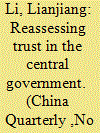| Srl | Item |
| 1 |
ID:
184715


|
|
|
|
|
| Summary/Abstract |
Survey results inflate political trust in China if the observed trust in the central government is mistaken for the latent trust in the Centre. The target of trust in the country is the Centre, which is ultimately the top leader. The critical issue domain for assessing the Centre's trustworthiness is policy implementation rather than policymaking. The Centre's trustworthiness has two dimensions: commitment to good governance and the capacity to discipline local officials. Observed trust in the central government indicates trust in the Centre's commitment, while observed trust in the local government reflects confidence in the Centre's capacity. A machine learning analysis of a national survey reveals how much conventional reading overestimates political trust. At first glance, 85 per cent of the respondents trust the central government. Upon further inspection, 18 per cent have total trust in the Centre, 34 per cent have partial trust and 33 per cent are sceptical.
|
|
|
|
|
|
|
|
|
|
|
|
|
|
|
|
| 2 |
ID:
073494


|
|
|
|
|
| Publication |
2006.
|
| Summary/Abstract |
Beijing may wish to keep the rural population as apolitical and passive as possible, but it must understand that this is fast becoming an impossible task."
|
|
|
|
|
|
|
|
|
|
|
|
|
|
|
|
| 3 |
ID:
081520


|
|
|
|
|
| Publication |
2008.
|
| Summary/Abstract |
Rural protest leaders in China play a number of roles. Among others, they lead the charge, shape collective claims, recruit activists and mobilize the public, devise and orchestrate acts of contention, and organize cross-community efforts. Protest leaders emerge in two main ways. Long-standing public figures initiate popular action on their own or in response to requests from other villagers; and ordinary villagers evolve into protest leaders when efforts to seek redress for a personal grievance fail. Rural officials sometimes attempt to co-opt or buy off protest leaders, but more often turn to repression. Although cracking down may inhibit further contention, at other times it firms up the determination of protest leaders and makes them more prone to adopt confrontational tactics, partly by enhancing their popular support, partly by increasing the costs of withdrawal
|
|
|
|
|
|
|
|
|
|
|
|
|
|
|
|
| 4 |
ID:
144540


|
|
|
|
|
| Summary/Abstract |
This paper argues that popular trust in the Chinese central government is significantly weaker than five national surveys suggest. The evidence comes from these surveys. First, the surveys show that between one- and two-thirds of respondents hold hierarchical trust, i.e. they have more trust in the central government than they do in local government. Second, all other things being equal, people who are less satisfied with political democracy in China tend to be less trusting of the central government. Finally, hierarchical trust holders tend to be less satisfied with political democracy in the country than those who express equal trust for central and local governments. Put together, the three findings show that hierarchical trust holders are less trusting of the central government than equal trust holders with regard to developing political democracy, although they sound equally confident. The fact that so many respondents hold hierarchical trust indicates that trust in the central government is significantly weaker than it looks.
|
|
|
|
|
|
|
|
|
|
|
|
|
|
|
|